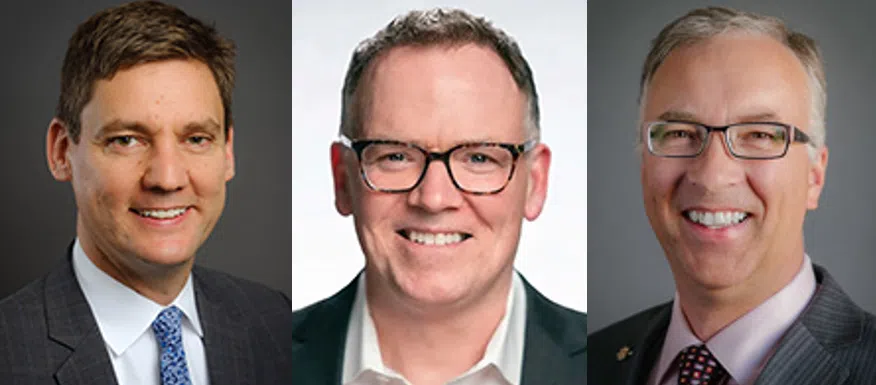
BC Premier David Eby (left), BC United Leader Kevin Falcon (centre), and BC Conservative Leader John Rustad (right). (Photos via BC Legislative Assembly)
British Columbia’s election campaign was unofficially launched on Thursday, five months ahead of the Oct. 19 vote, with Premier David Eby depicting it as “the starkest choice of a generation,” between the NDP and two opposition parties flirting with a merger.
The final day of the spring legislative session saw Eby summon his New Democrat MLAs and party staff members to the caucus meeting room at the legislature where he delivered an election-style speech focused on the months ahead.
Eby said BC United Leader Kevin Falcon and Conservative Leader John Rustad had “let the mask slip” this week that exploratory talks were underway about putting forward a coordinated centre-right political opponent to the New Democrats.
“They told us whose side they are on and it’s not your side,” Eby said.
He said “powerful interests are trying to arrange a marriage of convenience” between Rustad and Falcon.
“Well, I’ve got a message for these lobbyists and John Rustad and Kevin Falcon, the next election will be decided at the kitchen table, not the board room table.”
Eby said to applause and cheers that Rustad and Falcon both represent the same interests and that if elected “people will pay the price with higher fees, fewer services and fewer supports at the time when they need it the most.”
Falcon said Thursday that BC United had sent two envoys in recent weeks to find “common ground” with Rustad’s Conservatives but a merger was not likely.
However, he said he was consistently approached by people who say, “can you please, please don’t allow an NDP government to be re-elected on the basis of vote splitting.”
Historically, centre-right parties have repeatedly been elected in B.C. after successfully uniting the right-of-centre vote, including the former Social Credit and B.C. Liberals governments.
The New Democrats have meanwhile benefited in other elections by splits on the right of the political spectrum.
Falcon said he was committed to doing whatever he could to prevent an NDP re-election, but a merger with the B.C. Conservatives is “problematic.”
“There’s also real challenges,” he said. “There won’t be a merger as I’ve said before. There’s practical reasons why, but there’s also many of their candidates (who) are frankly too extreme. I can’t merge with a party that has candidates that equate vaccination with Nazism and apartheid.
“It’s just not going to work,” said Falcon. “Or candidates that say getting a vaccine shot, a COVID-19 shot, is going to turn you into a magnet.”
Rustad also said talks between the two parties had occurred recently, but the B.C. Conservatives plan to run candidates in each of the province’s 93 ridings in the fall.
BC United bluntly turned down overtures by the B.C. Conservatives to work together late last year, Rustad said.
Falcon ejected Rustad from the B.C. Liberals, now BC United, in August 2022 after the former cabinet minister started posting views on social media rejecting the idea that climate change was due to carbon dioxide emissions.
“There’s some people who have talked at a backroom level between the two parties about there being some sort of opportunity,” Rustad said. “I’m always open to having conversations because obviously we want to bring everybody together (that) we can to defeat this NDP government in October, but as far as the Conservative Party stands we will be running 93 candidates in this next election.”
Eby took aim at the Conservatives earlier this week on the issue of child care, mentioning Rustad and his party 10 times, while referring once to the Opposition BC United, signalling which party the NDP considers their main political threat.
The current standings in B.C.’s 87-seat legislature are 55 New Democrats, 26 BC United, two Conservatives, two Greens and two Independents.
In his remarks to the caucus, Eby said he wanted to quote Dolly Parton: “We cannot direct the winds but we can adjust the sails.”
















